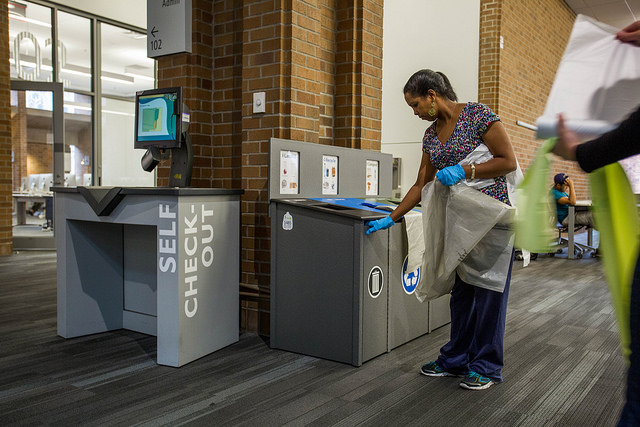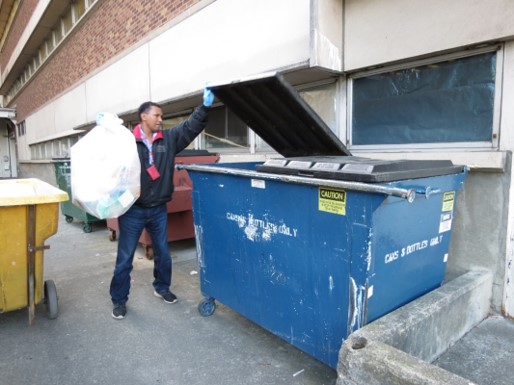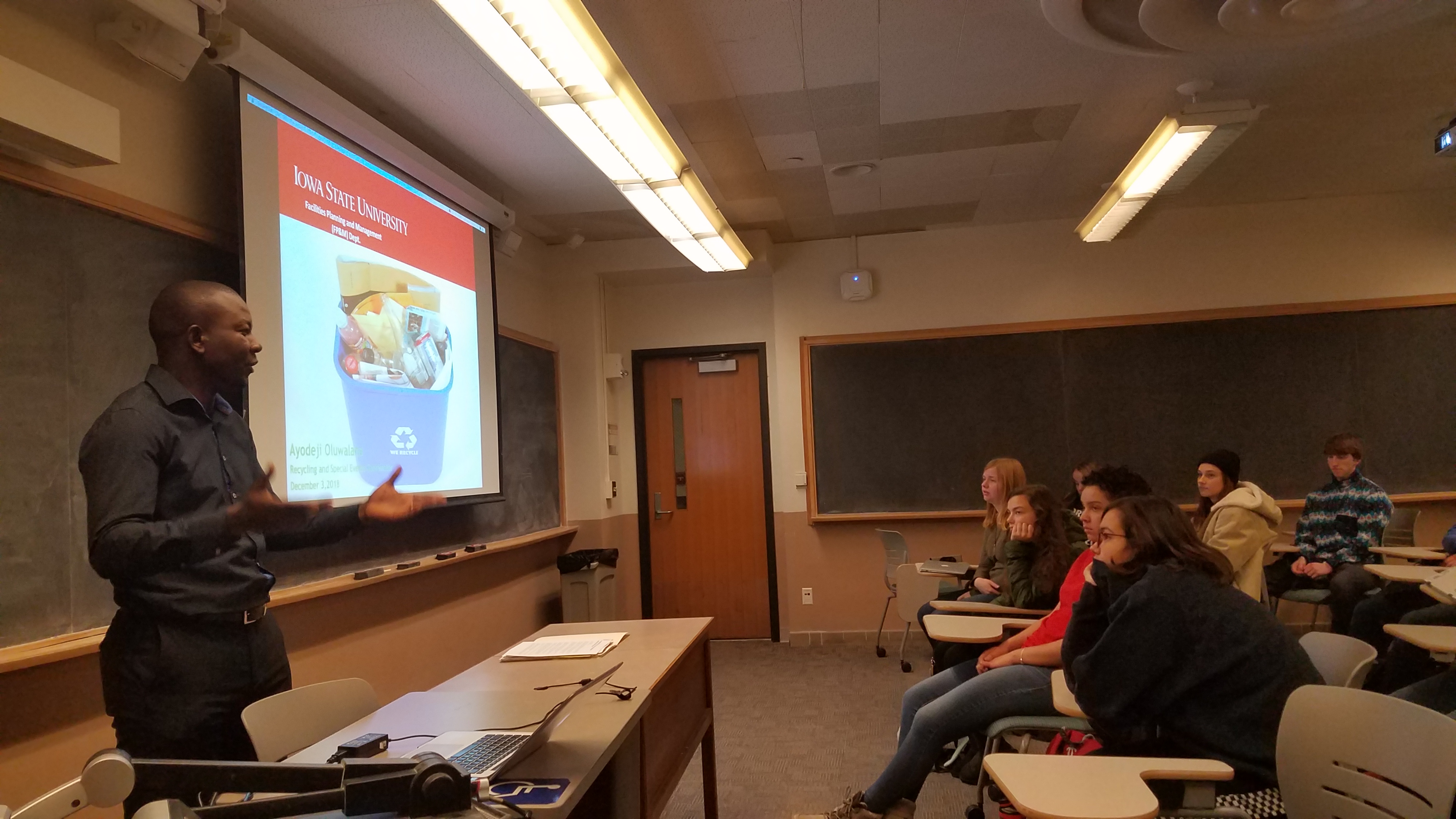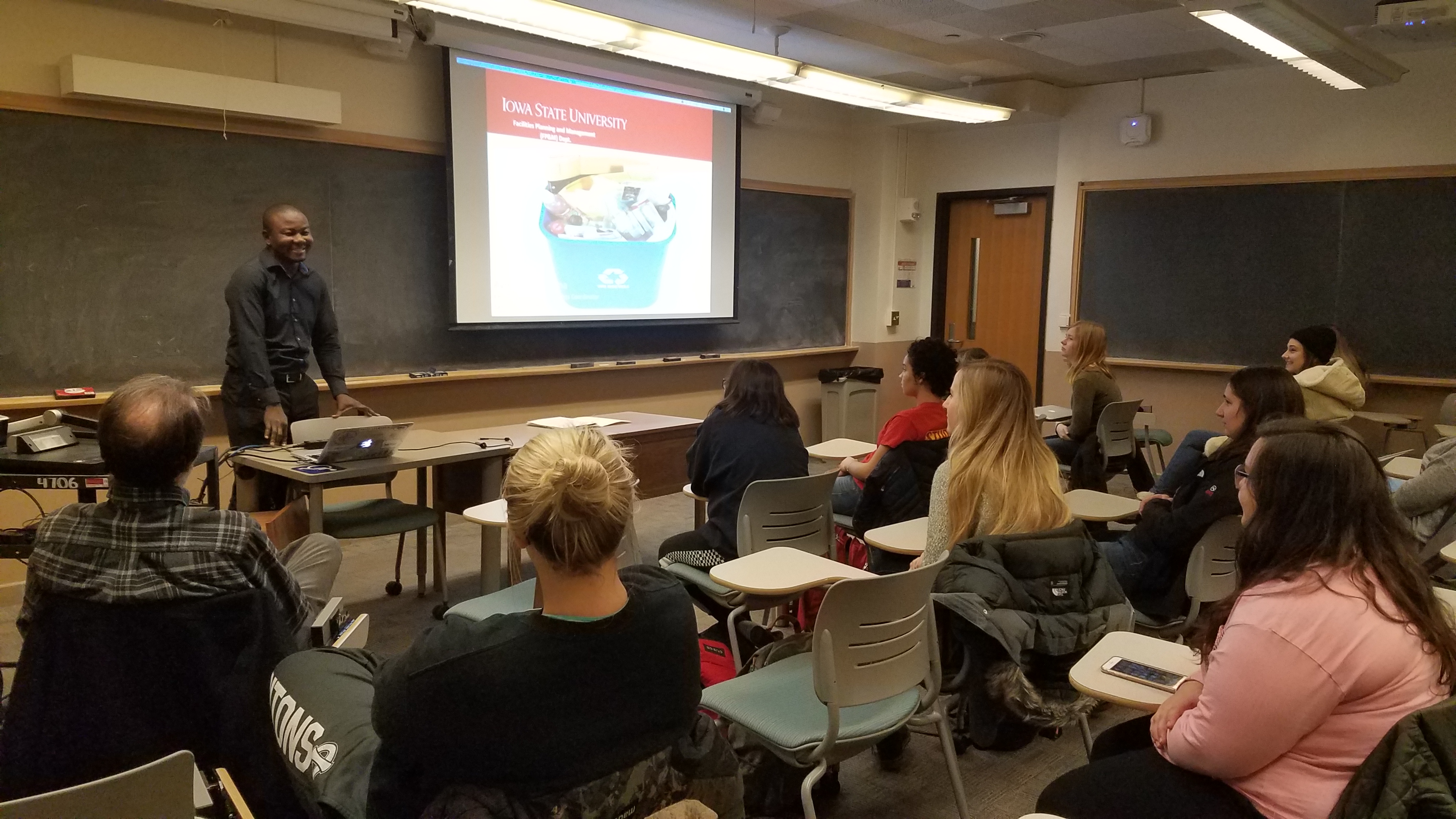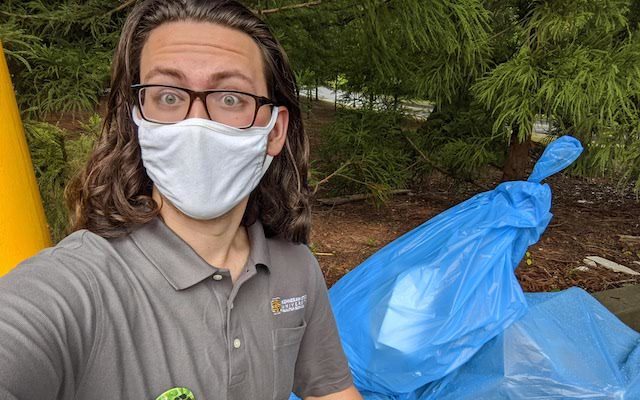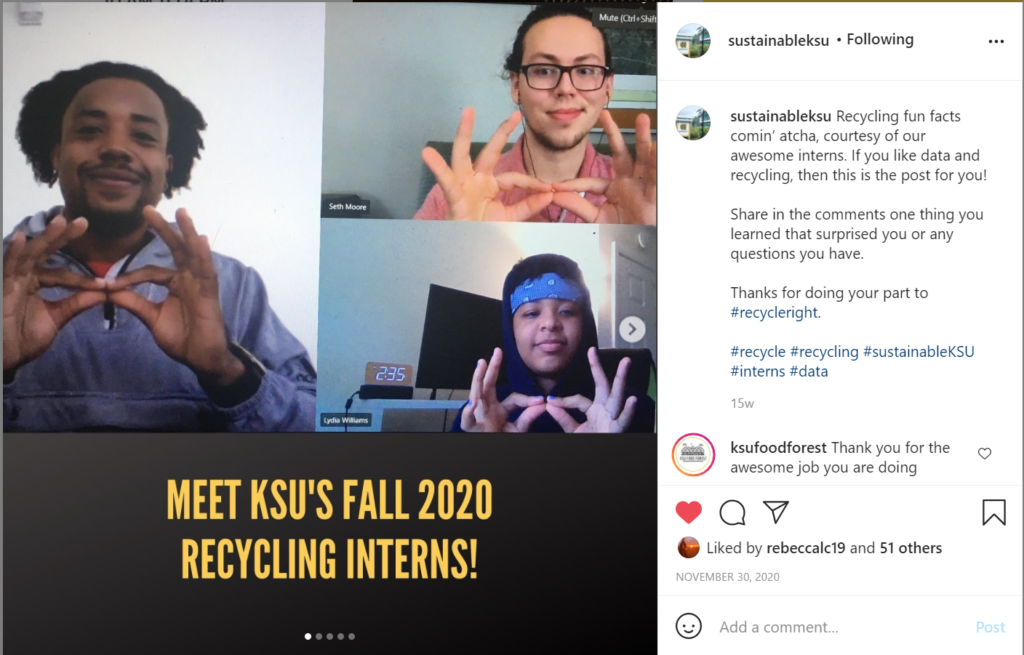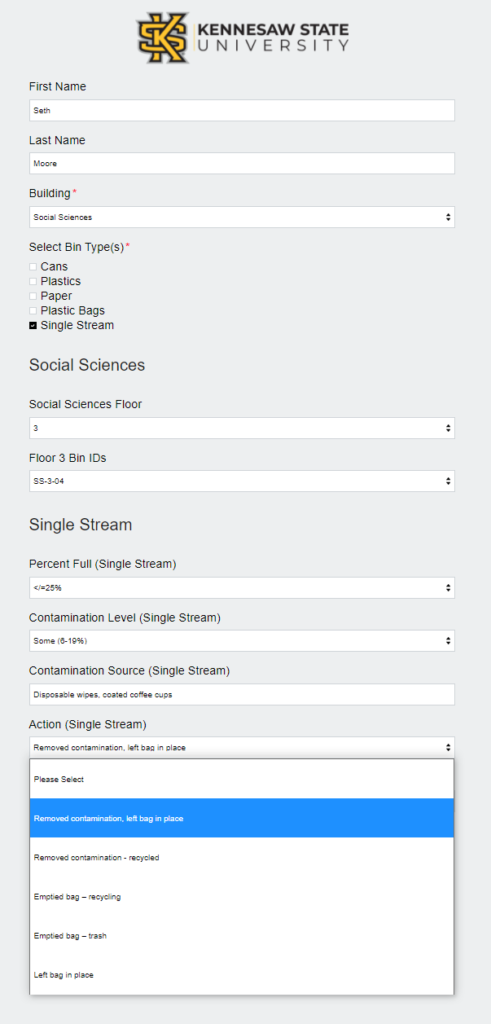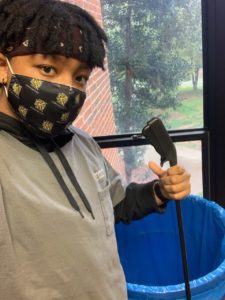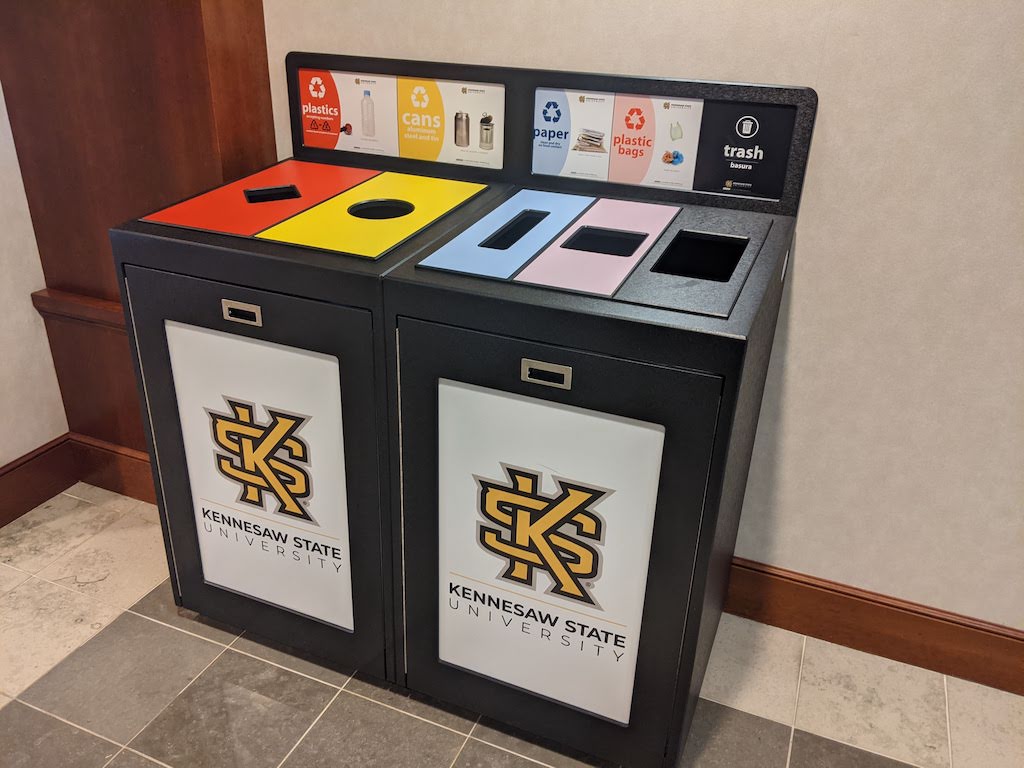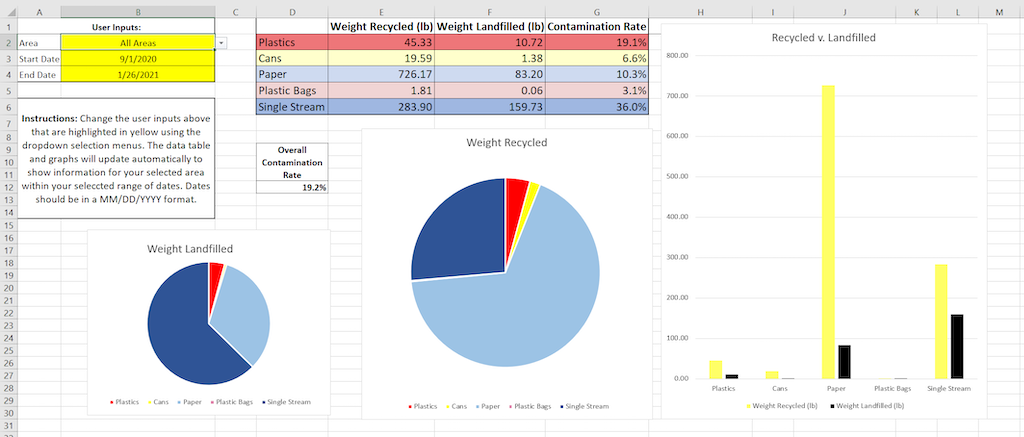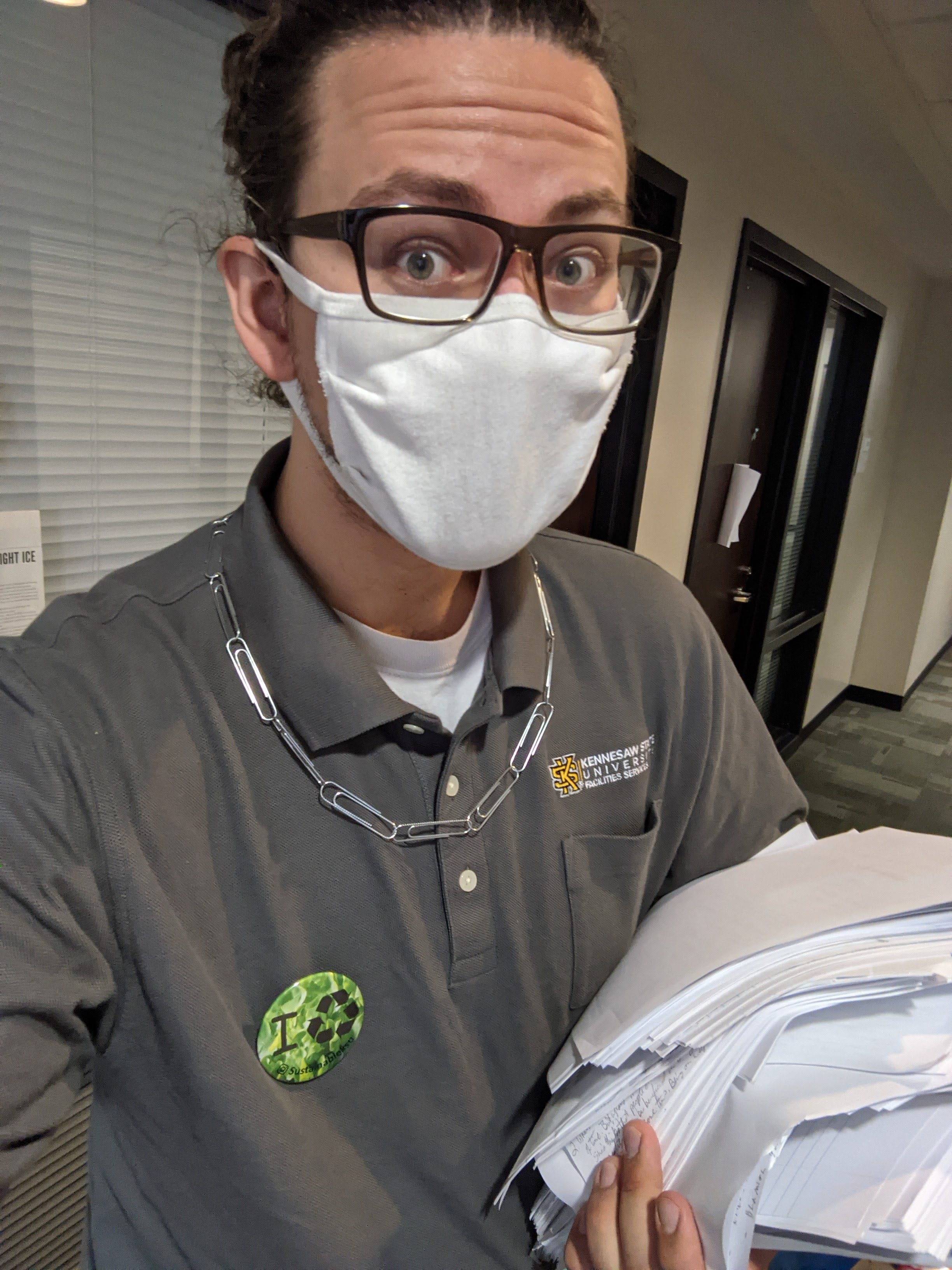University of Washington Builds to Last
University of Washington is not taking anything, or anyone, for granted. We spoke with Liz Gignilliat, the Recycling Manager at the university about how their university consistently plans success by keeping communication and connection open between everyone involved in making the recycling program work.
To start, the recycling office keeps in close contact with all custodial teams whom they work with. The majority of buildings (academic, administrative and facilities) are serviced by custodial teams, who are in the same office as UW Recycling: the Building Services Department. Custodial teams have nearly 270 employees, while UW Recycling has about 12. However, they always make sure they’re on the same page.
UW Recycling prepares and provides the bins. Custodians service them, and UW Recycling Operations Crew empties the dumpsters once they’re full. It’s a constant chemistry that justifies being in the same department. The custodians’ goals are cleanliness, health safety, Gignilliat says, and while the recycling office wants those as well, they are also looking to reduce waste and increase compost & recycling.
“We’re providing a safe environment and doing it in a green and sustainable way,” says Gene Woodard, Director of the Building Services Department in an interview with Healthy Green Schools & Colleges. “It’s the overall elevation this has for the people on my team that really makes me happy.”
But how do they make sure, on such a large campus (total enrollment of 47,554), that everything works in harmony?
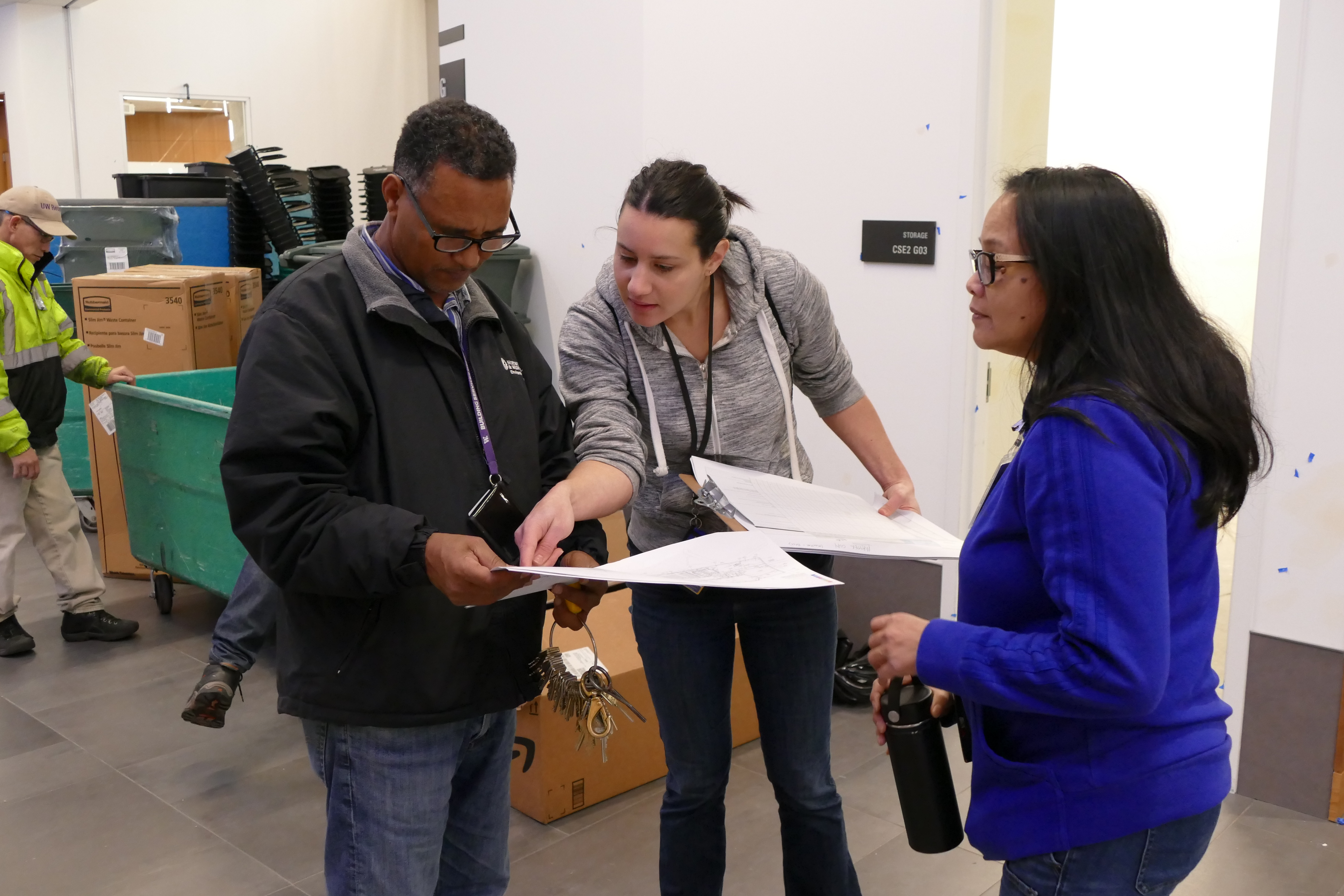
Working Together
Within the Building Services department, UW Recycling meets with the waste collectors each day in the afternoon to discuss any issues that are coming up. Across campus, UW Recycling stays in contact with custodial managers of each area of campus, including those not serviced by the Building Services department (such as housing, athletics or the hospital).
Before the pandemic, custodial groups in each area would meet in person to discuss issues, and if there was a waste related issue, custodial mangers would pass along the information directly to UW Recycling. If someone complains on campus, the issue is brought to UW Recycling and then it is discussed with custodial staff. In this way, feedback constantly flows between the different working groups on campus. Finally, if someone on campus wants more or less bins in a particular area, both UW Recycling and a custodial team member do a site visit together and make a decision on the request.
However, UW has pioneered a program which brings this collaboration beyond simple services and convenience of their staff to their health.
With the support of the Safety & Health Investment Project (SHIP)- a grant paid for by the State of Washington’s Department of Labor & Industries, UW Environmental Health & Safety and the Building Services Department have been meeting with custodial staff for over 5 years to talk about the ergonomics of their jobs. A physician and other members of the ergonomics project survey custodians each week about primary tasks and which ones are uncomfortable or painful. The staff in these meetings test products like vacuums, mops and recycling bins for safety and convenience.
“It’s so helpful. There are so many things that if you haven’t done it a thousand times, you would not think about it,” says Gignilliat who uses the information to purchase the best tools and bins for the UW campus. “They prevent a lot of headaches on our side.”
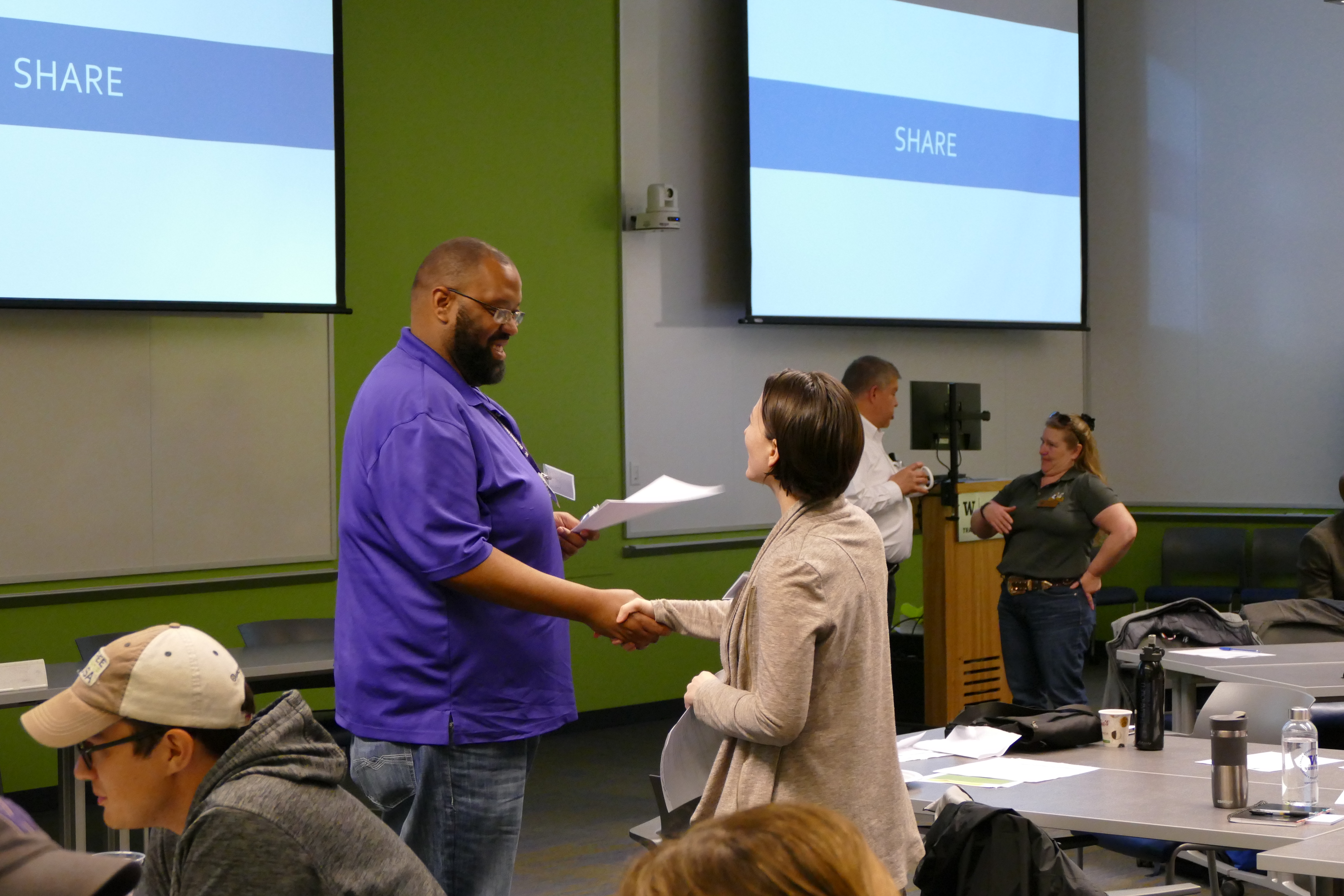
MiniMax Program Shows Success
The MiniMax program is one of the premier examples of the harmony cultivated between UW Recycling, Building Services custodians and the rest of the campus community.
The impetus for the program was the acquisition of a 22-story building which would serve as the main offices for the university. Named the UW Tower, the building has 510,546 square feet of floor space, and to service the space, custodians needed to come up with a more efficient way to collect waste.
The MiniMax program focuses on switching deskside lined garbage bins with custodial service to small, unlined deskside trash and recycling bins without custodial service. One purpose of the program is to both force people to become aware of their waste by bringing their own waste to a central waste station, and another is to significantly cut down on labor time and energy. Without servicing each desk, custodians can focus on more important tasks such as making sure public spaces are clean and safe.
“The MiniMax program is the perfect example of our goals being aligned with the custodial goals into a physical manifestation of a project” Gignilliat says.
Since its first implementation in 2008, the MiniMax program has spread across campus as a means of waste diversion and efficiency as a result of this collaboration between custodial staff and the UW Recycling office.
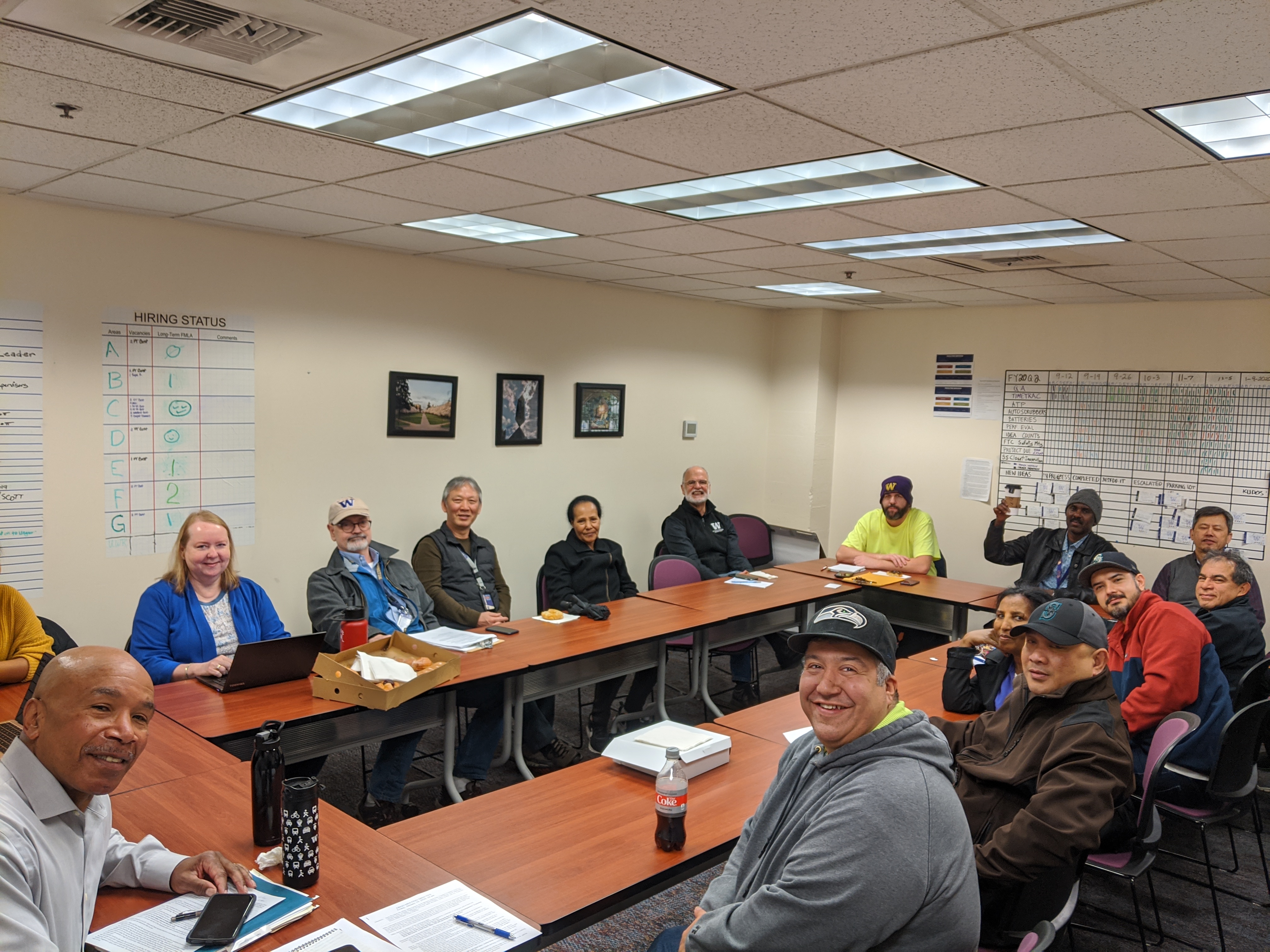
From a recycling office perspective, Gignilliat sees the input of custodial staff as essential to her success on campus.
“By understanding how their jobs work, you’re sharing respect for them and showing how much you value their time and their work.” Gignilliat says and leaves other recycling managers with a heads-up: “If you’re not asking them ahead of time, you’re just going to have to do more work later!”
Written by Eric Halvarson
If you learned from this spotlight, make sure to register for next month’s webinar Essential Workers as Essential Voices: Operations & Custodians in Waste Program Planning and Implementation on August 19, 2-3:00pm EST
For more information, contact Liz Gignilliat at lizg9@uw.edu. Liz is also a board member with CURC!
To see Liz speak more on the MiniMax program, you can view a presentation from a CURC webinar in 2016 called “Office Settings”
Thinking Systemically for Inclusive Recycling Programs
For Ayodeji Oluwalana, it’s personal.
Since becoming Iowa State University’s first full-time staff member dedicated to campus recycling, Oluwalana has hit the ground running- retrofitting the university’s hauling contracts to save them thousands of dollars and even setting a goal for the university to divert 85% of their waste stream from the landfill by 2025. For Ayodeji, often called Ayo, it’s more than a challenge- it’s a passion.
In 2012, Oluwalana was working as a university administrator in Nigeria when historically strong floods overwhelmed the country. Because he studied environmental management & toxicology as an undergrad, he understood the damage twice over. The flood had not only damaged property and taken people’s lives, but limited waste collection infrastructure was no match for the flood and the convenience of letting waste float away from people’s homes for free. For a place without infrastructure to handle the waste of the economy, climate change accelerated the pollution even further.
“I just kind of changed my focus,” he says, reflecting on the impact of the floods. “This is something that I’m passionate about, this is something that is really happening. What can I do?”
Starting at his university in Nigeria, he developed a waste to wealth initiative and a recycling model for the school to follow. He moved to Western Colorado State University to earn a Master’s degree in Environmental Management. Although in a different environment, Ayodeji was inspired by his firsthand experience with the effects of climate change on recycling infrastructure. As a graduate sustainability mentor, he wanted to share his experiences of social justice and climate change with younger students.
“When folks are telling you that this is very important don’t just feel like, you know, they are just saying things,” he remembers telling students. “I’ve been impacted. It’s real.”
Ayodeji began working at Iowa State in 2018, and his concern for those impacted has been key to his early and quick success. While gathering information about the campus waste stream, he began to rely on key stakeholders on campus including custodial staff, procurement and the Office of Sustainability. A campus zero waste plan is scheduled to be finished by the end of the summer, but it was written by a team made up of leaders from all across campus.
“How does what we’re trying to do impact their work? How does it impact their budget?” Oluwalana explains. “You have to maintain balance and make sure people are not excluded from what you’re trying to do… That was one of the reasons why in developing our zero waste plan the approach that I adopted was to bring everybody to the table, to give everyone a voice.”
Just like those who could not afford to recycle their materials in Nigeria, Oluwalana understands that recycling must be accessible and beneficial for everyone involved in order for the program to be supported. While it is important to shake up the status quo and look for alternatives, he says, sustainability professionals must make sure that people who will be impacted by the policy can name their concerns.
“I always think of that a lot being a person of color. Whatever solution I’m bringing to the table, how do I ensure that it is inclusive? Not even to minority groups, even to people that will be impacted, whether it be people of color or whatever,” Oluwalana says. “I want to make sure that I engage people equally, give them equal tools and equal opportunity to understand what we’re trying to do.”
Moving forward in his career, Ayodeji wants to see broader changes beyond his university campus. The university is only a part of the larger system of recycling, sustainability and the world’s political economy. Oluwalana encourages holistic thinking when approaching a task like recycling to avoid isolation, identify problems, who is responsible and how to engage them. He is a board member for the Iowa Recycling Association and chairs their student membership committee. It goes to show how Oluwalana is not interested in settling for change at the university level- that doesn’t match his passion.
“All of the social justice issues- equality, equity, inclusion- should be factored in our work as sustainability professionals,” Oluwalana says. “Because, whatever initiative we are trying to implement has one form of systemic changes that needs to occur… and within that systemic change, what are those groups of people that that disruption will impact and how can your work accommodate such people? You are trying to solve a problem yes, but again, you need to systemically look inwards and also look at ‘okay, where are those people that this work is going to impact in one way or another’.”
Written by Eric Halvarson
This was originally shared in the May 2021 edition of News to ReUse, CURC’s bi-monthly newsletter.
To read more about Ayodeji’s work at Iowa State University, review this list of relevant media publications below:
- From boxes as bedding to dorm room bins, recycling efforts blossom
- Trial run explores composting paper towels from campus bathrooms
- FY20 gave first full picture of campus waste production
- Students Prove Passion for Composting
- Reducing, reusing are keys to limiting COVID-19 waste surge
- With first full-time coordinator, recycling set to expand
If you are interested in sharing a story from your campus for a CURC spotlight, submit an interest form here on our website.
Kennesaw State Contamination Tracking Project Employs Student Leadership
Kennesaw State University’s Office of Sustainability is tying together recycling collection, student internships and an innovative waste audit system into a single pilot program. Across 10 select campus buildings, a group of 4 interns have taken over recycling & waste collection. These student employees work in a rewarding position that does more than sort waste- it serves a greater sustainability effort.
This pilot program was first conceived as a way to both involve students and to collect data on the campus waste stream. Building Services usually facilitates waste collection at Kennesaw State, but the Office of Sustainability was getting lots of requests to work on improving the campus recycling program. The two offices decided to choose a few buildings which only the Office of Sustainability would begin to collect recycling & waste from, giving them the freedom to operate and improve upon the recycling in those areas.
“Our facilities director at the time had this idea- let’s really bring the students into the ownership of this recycling,” says Jennifer Wilson, Kennesaw State’s Sustainability Coordinator. Wilson describes recycling as a gateway for students to broader ideas of sustainability, and she values the creativity and energy students bring to the program.
The project is a combination of waste collection & informal waste audits. Each intern is scheduled to visit the buildings they service and inspect each waste receptacle, which is uniquely labeled. Using an online form supported by the Kennesaw State IT department, interns record key data points for each recycling bin including if the container is contaminated, what the contaminants are and if they sorted out the contamination or not. Once the mini-audit is completed, the students take out the waste and move on to the next container. However, the team from Kennesaw State stresses that this is about more than sorting out other people’s contamination.
“We’ve had a new intern start and they kind of want to be able to pick out every piece of contamination in the bin so we can have a beautiful looking recycling stream,” says Seth Moore, a student working on the project. “But it definitely takes a little bit of experience and training for new interns to be able to understand what the overall goal with this is- so we can change our recycling system so we don’t see that contamination in the first place.”
The data from the forms each intern submits is compiled and analyzed in a master Excel sheet. Using this research, which includes anything from frequency of service to the type of signage on each particular bin, a pool of information is created to guide changes to their recycling program.
“That’s let us see basically the equivalent of conducting a waste audit everyday,” Wilson says. “The data piece really lets us look at, okay, how do we address contamination differently going forward and how do we provide better outreach materials”.
The team uses the data to better understand contamination patterns and make the case to get support when they need it, whether it be a move towards source-separated recycling or getting a paper baler. Interns working on this program have created videos for outreach based on their findings and will use this data to guide waste collection scheduling in the future. The student interns share an integral role in informing the campus’s waste efforts moving forward and get a meaningful look inside a recycling career.
“I’ve personally taken a lot out of this education,” Moore says. “Being in a place that we feel like what we’re doing matters and the projects we work on actually get to impact change where we are on the local level, it’s a good feeling. So I feel like it gives us not only the experience but also the passion to go forward and do more projects like this in the future.”
Written by Eric Halvarson
This was originally shared in the March 2021 edition of News to ReUse, CURC’s bi-monthly newsletter.
If you have questions related to Kennesaw State’s programs, visit their website sustainability.kennesaw.edu or you can email Seth Moore, one of the student interns interviewed for this article at kmoor153@students.kennesaw.edu.
You can also follow them on Instagram @sustainableKSU
If you are interested in sharing a story from your campus for a CURC spotlight, submit an interest form here on our website.
